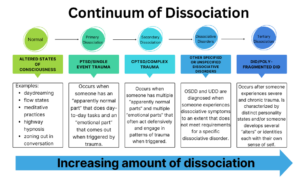Dissociation is such an interesting topic and one that has intrigued researchers, therapists, and individuals alike. Dissociation is our brain’s natural way of protecting us from overwhelming stress, trauma, or anxiety. While dissociation can manifest in various forms, its core function is to create a psychological distance from distressing experiences. In this blog I will delve into some of the intricacies of dissociation.
What is dissociation?
At its essence, dissociation involves a disruption in the normal integration of consciousness, memory, identity, emotion, perception, body representation, motor control, and behavior. It’s your mind’s way of hitting the “pause” button, allowing you to take a temporary break or escape from reality.
What causes dissociation?
 There are several theories on what causes dissociation. In general, dissociation occurs in times of heightened stress as a way to for your brain to protect you from becoming overwhelmed. Someone may be more prone to dissociation based on a number of factors including mental health symptoms, genetics, and previous traumatic experiences, for instance. Some common triggers include:
There are several theories on what causes dissociation. In general, dissociation occurs in times of heightened stress as a way to for your brain to protect you from becoming overwhelmed. Someone may be more prone to dissociation based on a number of factors including mental health symptoms, genetics, and previous traumatic experiences, for instance. Some common triggers include:
- Childhood trauma: physical, emotional, or sexual abuse occurring during childhood can lead a child to dissociate to mentally escape the abuse they’re experiencing. This can then transfer over to adulthood and lead to dissociation in response triggers as an adult.
- Single incident events: car accidents, assault, natural disasters, house fires, etc. These types of events can be so overwhelming for us to navigate that the brain dissociates to help us cope. Then experiencing reminders of those events in our daily lives can lead to dissociation.
- Relationship conflicts: fighting, arguments, gaslighting, name-calling, belittling, physical and/or sexual violence, etc.
- Prolonged stress: continual exposure to stressful environments such as abusive households, chronic invalidation in important relationships, severe neglect, etc. can all lead to dissociation as a way to escape the ongoing reality of the situation.
Continuum of Dissociation
Dissociation is often thought of as occurring on a spectrum. The graphic below illustrates the range of dissociative symptoms that people can experience.

Each of these stages is vastly complex and, if any of this seems interesting to you, I would highly recommend you do your own research to learn more. Van der Hart, Nijenhuis, and Steele’s work, “The Theory of Structural Dissociation of the Personality” explains this model of dissociation of the personality.

Now what?
Dissociation is a complex condition that serves an important function- to keep us from becoming overwhelmed. If you’re interested in managing and/or treating your dissociation, I highly encourage you to engage in psychotherapy. Dialectical Behavior Therapy (DBT) may be a good place to start to learn the skills to become more mindful, identify and regulate your emotions, communicate effectively, and tolerate distress. Having these skills can be integral to navigating dissociative symptoms.
Once you feel confident in these skills, trauma therapy can help you heal from your previous traumatic experiences and decrease the dissociative symptoms you’re experiencing. EMDR and ego state therapy are two great options for trauma work, especially when dissociation is a concern.
In the meantime, there are some things you can do to start helping yourself navigate dissociation today, if you feel ready to engage in these tasks:
- Find mindfulness practices you enjoy and integrate them into your day
- Learn grounding techniques (5-4-3-2-1, for example) to stay grounded throughout the day
- Expand your ‘tool kit’ of coping skills to include things such as physical activity, DBT’s crisis skills, talking to supportive people, etc.
- Find and engage in a support network
- Inform yourself more on dissociation
- Keep track of when you notice dissociative symptoms- what was happening, who were you with, what emotions you were experiencing, etc.
Conclusion
Living with dissociation can be challenging and it is possible to find ways to cope effectively. This blog just scratches the surface of dissociation- there is so much more to learn and uncover, especially as it pertains to your personal experiences with dissociation. If you are interested in seeking professional help to help you navigate this journey, please reach out to us, we’d love to have you!
About the Author
Maria Mangione (she/her), M.A., LPCC-S is a licensed clinical counselor who specializes in dialectical behavior therapy. She works to help people develop the tools they need to develop trust in themselves and build their life worth living. Maria believes in having meaningful connections with her clients and believes that therapy and healing can be fun. Click Here to learn more about Maria’s experience and therapeutic style.

